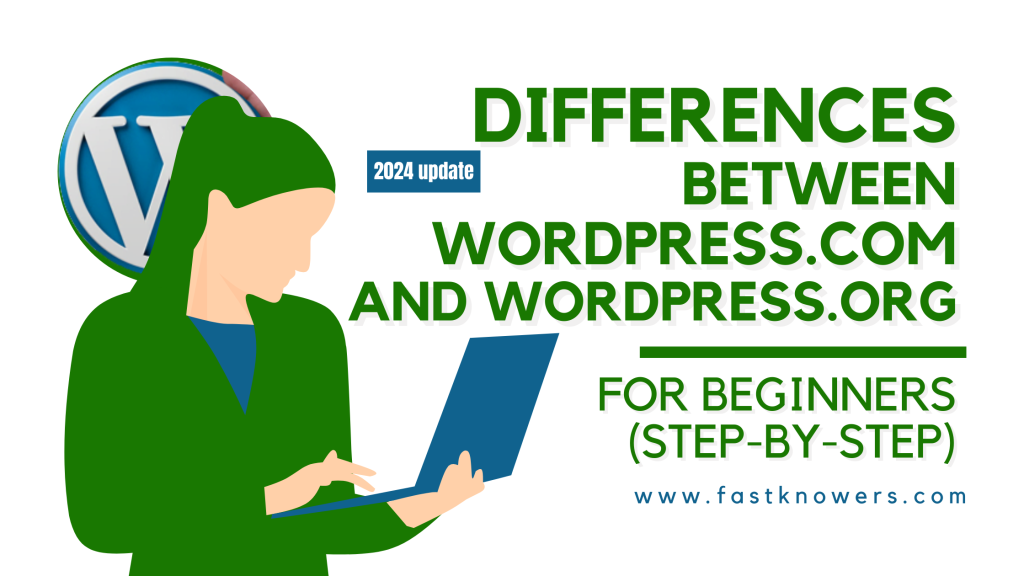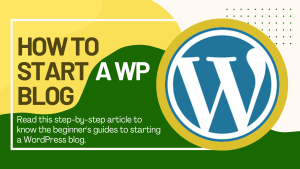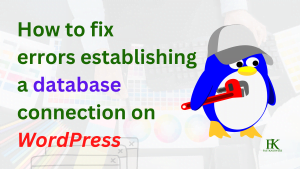When you’ve started intending to get a website for your business, you may wonder whether you should use WordPress.com or WordPress.org. Happily, both of them can help one get any type of website that one wants. However, they have some key differences. So, in this expert step-by-step guide, I will show you the differences between wordpress.com and wordpress.org.
Being a WordPress website developer and designer, we’ve taken a deeper look at all of the major factors and differences that come into play when deciding between wordpress.com and wordpress.org to create a website, blog, landing page, e-commerce website, etc. in order to help with making a better decision. You may see our expert step-by-step guide on how to start a blog with WordPress.
WordPress is an open-sourced software company with thousands of contributors. People (software developers of themes and plugins) have helped build WordPress into what it is today. It was first created by Matt Mullenweg (founder of Automattic) and his friend, Mike Little. Now, that you have known the founders of WordPress and how it is managed, then dive into wordpress.com and wordpress.org.

Differences between wordpress.com and wordpress.org
WordPress.com is free that doesn’t require hosting, themes, or plugins. In fact, it’s an open-sourced (free) software while WordPress.org is not free of charge but it is worth it.
That being said, both of them can help you get a website or blog, but their services differ in some key areas such as the pricing of getting a website, how your domain name looks; disk space for hosting your website properties, support, flexibility to earn money from your website, and lot more. You may see our expert guide on how to install WordPress in cPanel.
There are several ways that WordPress.com and wordpress.org differ from each other. On wordpress.org, you can decide on the layout of your website, and install any theme and plugin of your choice. , etc. but on WordPress.com, you can’t try that.
I am not here to condemn wordpress.com but to let you know some hidden secrets you need to know about them, so make sure before making any decisions about which of them would be best to create your website with.
| Feature | WordPress.com | WordPress.org |
|---|---|---|
| Hosting and Pricing | They have a free plan and paid plans; Personal, Premium, Business, and eCommerce plan. | They don’t have a free hosting plan, but their prices are cheaper than WordPress.com’s price. You may see the meaning of Shared hosting and why you should use it to create your website. |
| Domain Name | Attachment of WordPress, e.g., www.domain.wordpress.com | Your unique domain name only. |
| Disk Space | Disk space is limited and it depends on the plan you bought. | Disk space is unlimited plus free bonuses. You may see our expert guide on top WordPress shared hosting companies that have high disk space. |
| Support | They don’t support you. However, you can get support from other wordpress.com users via Forums which may not be okay for you especially when you need maximal support. Do you need any support on your website? You may see our expert guides about WordPress on our YouTube channel. | You will get support from different ways; your theme company, your web hosting registrar, etc. |
| Monetization | If you are using a free plan of WordPress.com, ads are displayed by WordPress on your website but you will be paid any commission | You can decide to display ads, for example, Adsense on your website at any time and get full commission from it. You may see our expert guide on the top best ways to make money on a website in 2024. |
| Customization | If you don’t upgrade to the paid plan, there is no feature of installing a theme and plugin on your website that can be used to customize the website. You can’t also edit your website’s theme file. | Once, you have gotten your cPanel and WordPress dashboard login details, you can customize your website to your preference by installing any plugin and theme of your choice. By clicking the Appearance menu on your WordPress dashboard and clicking the Edit theme file menu, you can add code to your website’s theme files such as header, footer, sidebar, comment section, post section, etc. You may see our expert guide on how to design a WordPress website. |
| SEO and Analytics | They provide you with basic ways to check your website analytics such as how many people visit your website. You can’t connect it to Google Analytics and search console because you can’t add domain verification to them at their <head> section which Google asks. | You have full control over your website SEO and analytics. You can connect with Google Console and Google Analytics to check the gender, location, interest, yeard, and a lot more about people who are visiting your website. By adding a verification code to the <head> section of your domain via the appearance, theme file editor, you can verify your domain on Google Search Console to track the analytics of your website from day one. You may see our ultimate SEO guides for WordPress. |
| Security | WordPress.com does not provide much security for your website if you are using their free plan. Your website can be hacked as you will not be allowed to install security plugins on it. | If you are using wordpress.org, you have full responsibility to employ security features for your website. Importantly, your web hosting registrar will secure your website for you. Most web hosting companies back up their users’ accounts in every 24 hours. You may see our expert guide on the top best security plugins for WordPress blogs. |
Differences between wordpress.com and WordPress.org in terms of their Features
1. Hosting and Pricing:
- WordPress.com offers hosting as part of its service. It has different pricing tiers, including a free plan with limited features and branding, paid plans (Personal, Premium, Business, and e-commerce), and custom enterprise solutions. Pricing varies depending on the features you need, starting from around $4 per month and going up to hundreds of dollars per month.
- With WordPress.org, you need to find your own hosting, which gives you more control over pricing. Hosting costs can vary widely, but you can find hosting for as low as $2-$10 per month for shared hosting or higher for more advanced hosting plans like dedicated hosting or Virtual Private Server (VPS).
2. Domain Name:
- WordPress.com: With the free plan, your domain will look like “yourwebsite.wordpress.com.” To have a custom domain (e.g., www.yourwebsite.com), you need to upgrade to a paid plan.
- WordPress.org: You can choose any domain you like, provided it’s available for registration. This means you have complete control over your domain name. You may check an available domain name for your domain using our Fastest Domain Name Checker.
3. Disk Space:
- WordPress.com: Disk space depends on your plan, starting from 3GB for the free plan and going up to 200 GB+ for higher-tier paid plans.
- WordPress.org: Disk space depends on your hosting provider. You can choose a hosting plan with the appropriate amount of disk space based on your needs.
4. Support:
- WordPress.com: Offers support through their forums. They provide priority support if you are their paid plan customer.
- WordPress.org: Support depends on your hosting provider. Some hosting companies offer excellent customer support, while others may have limited or community-based support.
5. Flexibility to Earn Money:
- WordPress.com: While you can monetize your website with affiliate marketing, WordPress will display ads on your website without paying any money to you. Unhappily, Google Adsense doesn’t accept such websites to display ads on your own.
- WordPress.org: You have full control and can monetize your website if you wish. You can display ad banners of your affiliated companies, sell products, and keep all the revenue.
6. Customization:
- WordPress.com: Offers limited customization options, mainly through themes and some basic customizations. Custom themes and plugins are only available on the Business and e-commerce plans.
- WordPress.org: Provides complete freedom to customize your website. You can install any theme or plugin, and even create custom themes and plugins to tailor your site to your needs.
7. SEO and Analytics:
- WordPress.com: If you are on a free plan of WordPress.com, you have basic tools in your dashboard to check your website pageviews and you have limited control over your viewers, i.e, you can’t know their age, gender, interest, and devices they use, etc. because you can’t connect your website to Google Analytics and Google Search Console. This can prevent determining how to do SEO for your website.
- WordPress.org: You have full control over your website pageviewers analytics which you can use to do SEO. You can connect your website to the Google Analytics and Google Search Console. You may see our expert step-by-step guide on how to do keyword research for your blog post.
8. Security:
- WordPress.com: Security is managed by WordPress.com, though, if you are on the free plan, they won’t protect your site very much.
- WordPress.org: You are responsible for your site’s security by installing security plugins. Your web hosting registrar will also provide you with every support you may need. You may see our expert tips on how to choose the WordPress web host.
In summary, the choice between WordPress.com and WordPress.org depends on your specific needs and preferences. WordPress.com is more user-friendly, suitable for beginners, and offers an all-in-one solution. WordPress.org provides more control, flexibility, and potential for revenue but requires more technical knowledge and responsibility for hosting and maintenance.
Between WordPress.com and wordpress.org which one is better?
If you’re looking for the best option between wordpress.com and WordPress.og to create your website, below are some factors that you need to consider:
#1. Hosting
WordPress.org is the more advanced version of WordPress, and it comes with a few extra features that you won’t find in the free version (like custom fields). The main difference between these two options is how they handle hosting:
WordPress.com provides free hosting, but you’ll have to use their themes and plugins. You can also add your own domain name if necessary, but this isn’t recommended as it’s not secure enough for most users’ needs.
WordPress.org requires you to host your own site, but there are several providers available that allow anyone who wants one to get one easily without having any technical knowledge or experience whatsoever!
Once again though, this isn’t recommended because there are some security risks involved when using self-hosted sites; however, if none of these concerns apply then go ahead!
#2. Themes
If you want to customize the look and feel of your website, then WordPress.org themes are the way to go. WordPress.com themes are free but not as good as premium WordPress.org themes.
WordPress has two types of themes: free and paid-for premium ones (you can find them here). Free widgets can be added by using WP-Admin > Settings > Widget or by embedding them into another page or post via shortcodes like [shortcode] or [widget name].
Themes on both versions differ in price and complexity but can be customized with CSS, PHP, JavaScript (JS), or HTML. WordPress.com themes are free but not as good as premium WordPress.org themes.
WordPress has two types of themes: free and paid-for premium ones (you can find them here). Free widgets can be added by using WP-Admin > Settings > Widget or by embedding them into another page or post via shortcodes like [shortcode].[
#3. Plugins
Plugins are a collection of functions and code that extend the functionality of WordPress. They can be downloaded from the official WordPress repository, which you can access by clicking “Plugins” on your dashboard.
Plugins are not included with your account on WordPress.com; they’re only available through the official repository (this is one difference between them).
The plugins you download from there will work just like any other plugin you install manually or automatically via a script called Composer Scripts (which I talk about below).
You can also install and activate plugins manually by uploading them to your WordPress.org account. This method is perfect if you don’t have access to the official repository or want more control over what plugin options are available.
#4. Ads
WordPress.com has ads on the free version, which is a bit of a turnoff for some of your audiences or users of your website. WordPress.org doesn’t have any ads on its free version and simply charges for upgrades to remove them completely.
WordPress.com offers a paid premium version that removes all ads and adds some extra features such as custom domain names and SSL security certificates (the latter is important if you’re running your own blog).
If you want a nice-looking website without spending much money or worrying about ads, then go with WordPress.com. It has all the features you need and is easy to use.
If you’re building an e-commerce site where customers will buy products from your store through their credit cards, then consider WordPress.org because of its superior security options.
#5. Branding and Licensing
WordPress.com is a free service, but it has limitations on what you can do with your site. If you want to use the full power of WordPress (and its development community), then you will need to pay for hosting and domain name registration with WordPress.org instead.
WordPress.org offers more plugins and themes than its sister site does it also makes it easier for developers to find resources if they need help building their own plugins or themes for their clients’ businesses or personal blogs.
WordPress.com is the most popular choice for beginners and small businesses because it’s easy to set up a website without having any coding skills.
WordPress.org has the advantage of being cheaper in terms of upfront costs per month, but it comes with a learning curve that can be daunting if you’re not sure how websites work under the hood or aren’t willing to spend time researching what each feature does.
#6. Design and Customization Options
If you’re looking for a more customizable platform, WordPress.org is the way to go. It offers many more themes and plugins than its counterpart, which makes it easier to customize your site without having to be a developer yourself.
In addition to this increased accessibility, WordPress.org also has a larger community of developers available who can help you with any problems that may arise when using their software.
This means that if something doesn’t work out as expected or if there are bugs in one of your plugins, chances are someone else has already encountered them before and fixed them!
Additionally, so many people use the same tools, especially those who write articles about how great they are, and there are already existing resources available online for learning how things work under the hood.
#7. Support
WordPress.com has a help center for your questions, whereas WordPress.org doesn’t have a support forum or premium support option.
WordPress.com’s premium support option is one of its best features; it allows users to submit their issues directly through the website without having to go through email or phone lines first (which can be frustrating).
The website also offers live chat support 24/7, so if you run into any issues while working on your site, they’re available by clicking on the help icon in the bottom right corner of their page and asking away!
For troubleshooting, both WordPress.com and WordPress.org’s websites offer detailed information about common issues people run into while working on their websites. WordPress.org has a huge developer community, which means you’ll have more options when it comes to finding plugins and themes.
In addition, the team at WordPress will help you troubleshoot any problems with your site if needed. It’s important to note that both companies offer paid versions of their software the difference between them is that WordPress.com doesn’t allow developers access while Presses owns website files on their own servers so they can edit them.
#8. Security and Backup
WordPress.com offers automatic daily backups, but you have to install a plugin for that on your site if you want it. The good news is, that the plugin is free and easy to install (it’s called BackupBuddy).
If you don’t want to do that, just sign up for our WordPress security scanning service at wordpresssecurityscanner.com and we’ll scan your site with hundreds of different types of hackers in order to find out what needs fixing before they can get into your account or steal data from it!
WordPress.org offers automatic backups as well (with many more features than WordPress itself), but they require an extra step: installing the backup add-on after creating an account with them first (this process doesn’t seem too difficult).
This means that if anything goes wrong with your site while using WordPress.com instead of hosting services like Bluehost or DreamHost which offer better support options when things go wrong you might lose everything!
#9. E-commerce Capability
WordPress.com is not a good option for e-commerce, while WordPress.org is a better option.
WordPress.org is more flexible and customizable than WordPress.com, which means that you have more control over your site’s design, layout, and functionality in general and this makes it easier to build an e-commerce website on top of this platform than with something like Shopify or WooCommerce (which are primarily website builders).
So if you want to sell products online as well as deliver content online through blogs and forums then this could be an attractive option for you!
When you’re deciding between WordPress.com and WordPress.org, you’ll need to think about what’s more important to you in a blog or website.
WordPress.com is a hosted service that gives users access to the latest version of WordPress (the software), its plugins and themes, as well as support from their community of users and developers.
Users can log into their account at any time without having to download anything themselves because everything is already downloaded on their computer prior to logging in!
This means that there will usually be no lag time when posting content since everything has already been transferred over once logged into your account so don’t worry about waiting for files like images or videos after clicking the submit button; it just happens automatically!
All these features make it easy for anyone new who wants to start blogging immediately without worrying about having technical knowledge beforehand; however, there’s also something else called the “Premium” plan which costs $20 per month but provides some additional benefits depending on how much money you want to spend each month (upwards).
Conclusion and more reading
WordPress.com and WordPress.org are great options for bloggers and website owners who want to host their own websites, but there are some important differences between the two services that you’ll need to consider before making your decision. If you’re looking for a more affordable option, WordPress.org is definitely worth considering as well!
Hope this article has helped you know the differences between wordpress.com and wordpress.org. You may see our expert guide on the top best page builder for WordPress in 2023. If you know this article is helpful, then please subscribe to our YouTube channel for more updates. You can also find me on Facebook.






Let me reexplain to you in a nutshell what this writer meant in this article. With WordPress.com, you can get a website for free without domain and hosting while you must get your own domain and hosting if you are to use normal or original WordPress.